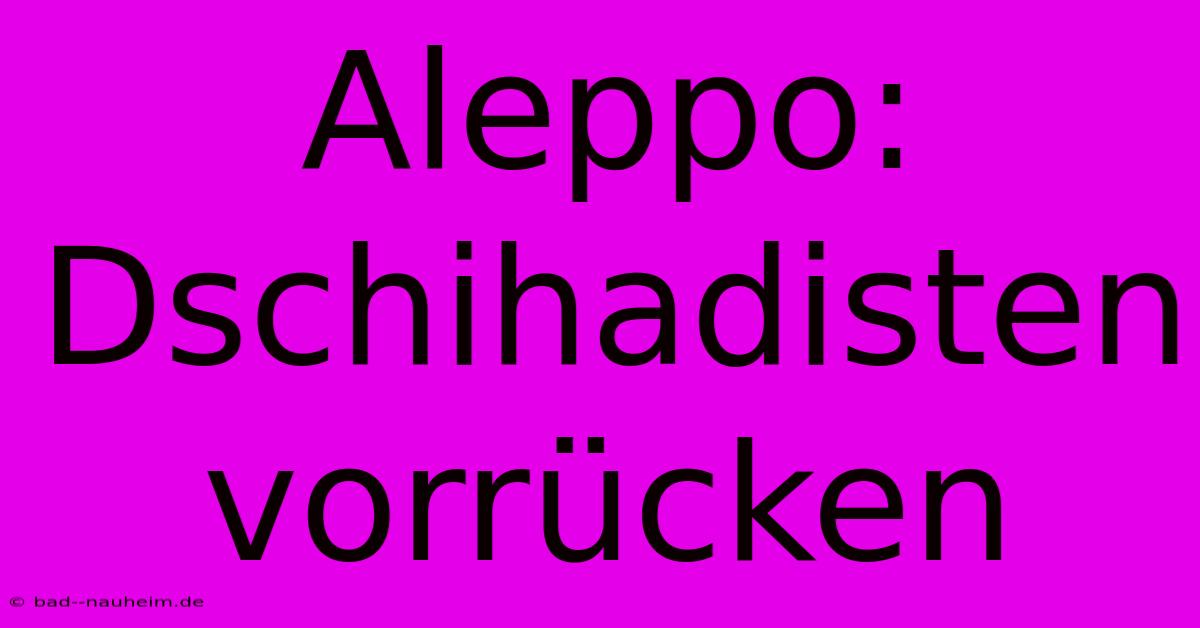Aleppo: Dschihadisten Vorrücken

Discover more detailed and exciting information on our website. Click the link below to start your adventure: Visit My Website. Don't miss out!
Table of Contents
Aleppo: Dschihadisten vorrücken – Ein Rückblick und die anhaltende Krise
Man, oh man, Aleppo. Just saying the name brings back a flood of memories, mostly grim ones. I remember following the news obsessively back in, what was it, 2012? The sheer scale of the humanitarian crisis was – and still is – mind-boggling. This wasn't just some local skirmish; this was a full-blown, brutal conflict that, frankly, still haunts me. The images, the stories… they stick with you.
Die anfängliche Euphorie und der bittere Rückschlag
Initially, there was a sense of hope, a naive hope, maybe. The initial rebellions against Assad's regime felt like a righteous uprising. There was talk of freedom, democracy, a brighter future for Syria. You saw videos, amateur footage, showing people celebrating in the streets, thinking this was the beginning of the end of a brutal dictatorship. Social media was buzzing with updates, people sharing their stories, their experiences, their fears. I was glued to my screen, desperately hoping for a peaceful resolution. It was naive, I know now.
But then…the jihadists. That's when things went sideways, really sideways. Groups like ISIS and al-Nusra began gaining ground, exploiting the chaos and power vacuum. The initial, relatively moderate opposition groups were pushed aside or absorbed. Suddenly, the fight wasn't just about Assad anymore. It became a complex, multi-sided conflict with extremist elements taking center stage. This was a huge turning point, a moment where many realized the true horror of the situation. The hope…well, it kinda evaporated. It was a harsh lesson in geopolitics and the unpredictable nature of armed conflicts.
Der Vormarsch und seine Folgen: Ein humanitäres Desaster
The advance of jihadist groups in Aleppo was relentless, and its consequences were catastrophic. Civilians were trapped, caught in the crossfire, becoming victims of unimaginable brutality. We heard stories – countless stories – of massacres, sieges, and widespread suffering. Hospitals were bombed, access to food and clean water was severely limited, and thousands of people were displaced, becoming refugees.
I remember reading articles about children starving to death, families separated, entire neighborhoods reduced to rubble. It was overwhelming. I tried not to think about it too much, but the images would pop into my head at the strangest times. It was brutal. Really, really brutal.
Was wir daraus lernen können: Über die Komplexität von Konflikten
Looking back, the events in Aleppo serve as a stark reminder of the complexities of modern conflicts. It's not always a simple case of good versus evil. The situation was – and continues to be – incredibly nuanced. There's no easy answer, no single villain, no simple solution.
What we can learn is the importance of:
- Critical thinking: Don't believe everything you read online. Verify information from multiple reliable sources before forming an opinion. The internet is full of propaganda, misinformation, and fake news.
- Empathy and compassion: Remember the human cost of conflict. These weren't just numbers on a screen; they were real people with families, dreams, and lives that were shattered.
- Supporting humanitarian aid: Organizations like the Red Cross and Doctors Without Borders play a crucial role in providing assistance to those affected by conflict. Donate if you can.
Aleppo serves as a painful reminder of the human cost of conflict, the dangers of extremism, and the complexities of geopolitics. It's a story that continues to unfold, a story we should all learn from. The suffering there continues, and the lessons learned should never be forgotten. It's a heavy topic, but one that deserves our attention and understanding.

Thank you for visiting our website wich cover about Aleppo: Dschihadisten Vorrücken. We hope the information provided has been useful to you. Feel free to contact us if you have any questions or need further assistance. See you next time and dont miss to bookmark.
Also read the following articles
| Article Title | Date |
|---|---|
| Drei Tote Polizei Ermittelt In Pforzheim | Nov 29, 2024 |
| Amorim Vs Ten Hag Entlassungskosten | Nov 29, 2024 |
| Bewaffneter Mann Bei Harris Aufenthalt | Nov 29, 2024 |
| Nintendo Switch Black Friday Top Angebot | Nov 29, 2024 |
| Verletzte Kehren Zurueck Ins Training | Nov 29, 2024 |
